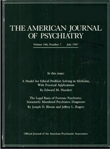Major depression following smoking cessation
Abstract
OBJECTIVE: The authors examined the incidence and predictors of major depression following successful smoking cessation treatment, with special attention to the influence of past major depression. METHOD: Three-month follow-up data were obtained from 126 subjects who successfully completed a 10-week smoking cessation program. RESULTS: The 3-month incidence of new major depression following treatment for nicotine dependence was 2%, 17%, and 30% among subjects with histories of no major depression, single major depression, and recurrent major depression, respectively. A history of major depression and persistent withdrawal symptoms independently predicted posttreatment major depression. CONCLUSIONS: Continued patient care beyond the 2-4-week period associated with the nicotine withdrawal syndrome is indicated when abstinence is attempted by smokers with prior major depression.



